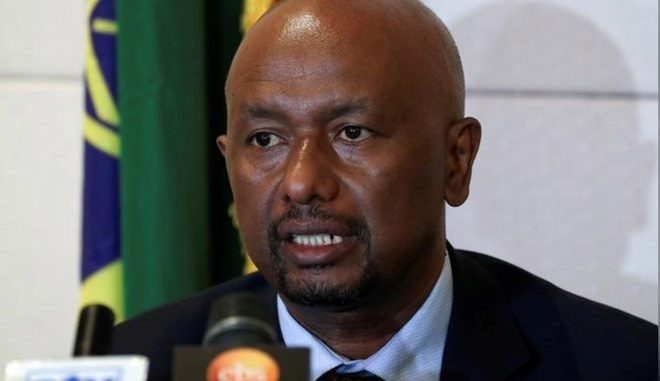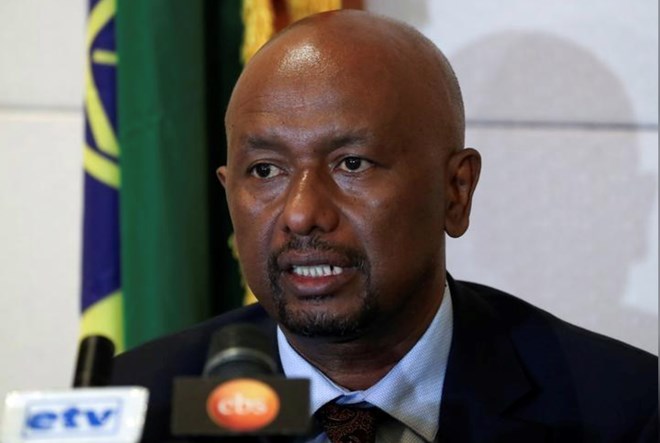
Egypt, Ethiopia, Sudan deadlocked over giant Nile dam, look to Washington talks


Saturday January 11, 2020
Ethiopian Minister of Water, Irrigation and Energy, Sileshi Bekele, speaks during a news conference after the trilateral ministerial technical meeting on the case of Ethiopia’s Grand Renaissance Dam in Addis Ababa, Ethiopia, January 9, 2020. REUTERS/Tiksa Negeri
ADDIS ABABA (Reuters) – Egypt, Ethiopia and Sudan remained deadlocked after two days of talks in their disputes over a giant hydropower dam on the Nile though Cairo said it hoped the issues would be resolved by Jan. 15 in line with a deadline agreed with Washington.
“We did not reach an agreement today but we achieved clarity at least on all issues including the filling. We hope to reach a deal next week in Washington,” Egyptian Water Minister Mohamed Abdel Aty told Reuters late on Thursday after two days of meetings in the Ethiopian capital Addis Ababa.
The countries are due to convene on Jan. 13 in Washington with the aim of resolving their disagreements by Jan. 15 over the filling and operation of the $4 billion hydroelectric dam that Ethiopia is building on the Nile.Ads By Google
They agreed to the timeline after a meeting in Washington with U.S. Treasury Secretary Steven Mnuchin and World Bank President David Malpass in November.
After the meetings in the Ethiopian capital ended with no progress, Ethiopian Water Minister Sileshi Bekele accused Egypt of coming to the talks with no intention of reaching a deal.
“We didn’t agree on the filling of the dam as Egypt presented a new proposal requesting the filling to be carried out in 12-21 years. This is not acceptable. We will start the filling of the dam by July,” Sileshi told a news conference.
The dispute over the filling and operation of the massive dam has sparked a diplomatic crisis between Egypt and Ethiopia, who both see existential threats in each other’s positions on the project.
Cairo fears the Grand Ethiopian Renaissance Dam (GERD) will restrict supplies of already scarce Nile waters on which its population of more than 100 million people is almost entirely dependent.
Addis Ababa denies the dam will undermine Egypt’s access to water and says the project is crucial to its economic development, as it aims to become Africa’s biggest power exporter with a projected capacity of more than 6000 megawatts.
One diplomat close to the talks said Ethiopia did not offer sufficient guarantees on water reserves.
“Ethiopia is not willing to commit to any meaningful mitigation safeguards including during extended drought, therefore there was no prospect for an agreement. Next step is going to (Washington),” he said.
If the dispute is not resolved by Jan. 15 then an international mediator will be appointed to help resolve it, according to the deal the countries reached in Washington.
Reporting by Giulia Paravicini and Dawit Endeshaw, Editing by Maggie Fick and Mark Heinrich